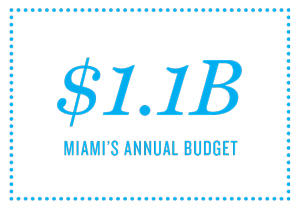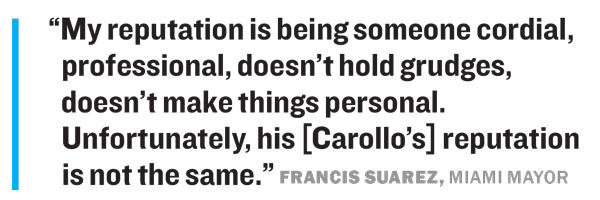The Miami City Commission kicked off a new decade with fireworks. There were displays. And there were some burns — in the form of shouted insults — that set the tone for months to come.
In that January 9th meeting, Commission Chairman Keon Hardemon was initially marked absent, and three of his colleagues decided to rearrange the written agenda. Then, after more than an hour of public comments from residents and stakeholders, Hardemon appeared. Apologizing for being late, the chairman explained he had been in bed with the flu and hadn’t eaten anything for six days.
“My illness is in my body,” he said. “For some it is in their mind. We are going to get through the business of the city, get through the year. All of us as citizens and not as individuals.”
Hardemon then insisted that the personal appearances by Super Bowl host committee chairman Rodney Barreto and the beleaguered city manager, Emilio Gonzalez, be heard first. But Commissioner Joe Carollo objected, declaring that the agenda had already been set. After arguing over who was out of order, a motion was made to adjourn the meeting, which passed 3 to 2. But the yelling wasn’t over yet.
“We have an issue with commissioners who want to abuse their authority!”
Hardemon yelled. “That is what this has come down to. This community will continue to suffer as long as they continue to do that.”
Carollo replied that Hardemon’s problem was that he “did not like majority rule,” and then yelled, twice: “How much money has the manager raised for you?”
Miami is no stranger to political warfare. In the past, the city has dealt with a financial crisis, allegations of absentee voter fraud and a failed referendum to dissolve the municipality.

Today, the city has a $1.1 billion budget, thanks in large part to a wave of real estate investment that has funded the development of tens of thousands of new residential units in the past decade. Some real estate professionals are worried that the unstable state of affairs at Miami City Hall might make developers think twice about investing in the Magic City.
“I have heard rumbling for a while now, especially about Carollo, amongst outside investors and overseas investors… International companies recognize there are problems,” said Bill Fuller, managing partner of the Barlington Group, a Little Havana developer who is suing Carollo. “They see what’s going on. They remain very, very, very concerned.”
In recent weeks the conflict at city hall has calmed down, at least publicly, especially in the wake of the COVID-19 pandemic, which, as of deadline, has forced Mayor Francis Suarez to go into quarantine after testing positive for the virus. Nevertheless, the fighting among Miami’s leaders can easily flare up again.
Wynwood real estate developer David Lombardi said Miami’s recent chaotic meetings, and the canceled meeting of January 9, are “enough to make big developers from outside of the area reluctant to come in.”
It’s also a particularly perilous situation for anyone wishing to obtain a zoning change, said one real estate broker, who did not wish to be identified for fear of retribution.
“You can quantify interest rates. You can quantify construction costs. You can quantify market risk to some extent,” the broker explained. “But political risk is unquantifiable.”
Developer Michael Wohl, principal of Coral Rock Development Group, said he believes the “dysfunctional” reputation at city hall may dissuade outsiders from investing in Miami. “It may inhibit some folks who are not savvy politically here to get involved in development,” he said.
 Carollo insisted that most investors don’t know or care who is on the Miami City Commission. “The only ones that care about who the commissioners are, who the mayor is, are those who want to buy property and then get a rezone so they can build 50 or 60 percent more,” he said.
Carollo insisted that most investors don’t know or care who is on the Miami City Commission. “The only ones that care about who the commissioners are, who the mayor is, are those who want to buy property and then get a rezone so they can build 50 or 60 percent more,” he said.
But fighting among elected officials has created a mood of uncertainty when it comes to zoning change requests, reforms to the Miami 21 zoning code or addressing the city’s affordable housing crisis. “When you have no predictability in city hall, it means development is wary,” said Juan Mullerat, principal of Plusurbia Design.
Commissioner Alex Diaz de la Portilla, considered by many as part of Carollo’s coalition on the board, said there is no “empirical evidence” that real estate investors are being dissuaded by the politics of the city.
“We got a lot of good things going on, and we will continue having a lot of good things going on here,” he said, suggesting that some commissioners haven’t adjusted to a “different majority.”
Power grab
Carollo formed a majority on the commission after former state senator Alex Diaz de la Portilla was elected District 1 commissioner. Both Diaz de la Portilla and District 4 commissioner Manolo Reyes supported Carollo’s motion to fire city manager Emilio Gonzalez in December. Though the motion fell short of the city charter’s requirement, Gonzalez declared his intention to resign and went on family leave. Soon after, Deputy City Manager Joe Napoli announced his intention to leave for a new post in Cooper City. After weeks of uncertainty over who would run the city, Mayor Suarez named parking authority chief Art Noriega on February 24 as the new city manager, which was ratified unanimously by the commission.

But there were other power plays afoot. At a January 17 meeting, the trio of commissioners voted to strip their colleague, commissioner Ken Russell, of the chairmanship of the Miami Downtown Development Authority (DDA) and the Omni Community Redevelopment Agency (Omni CRA). Both agencies are inside Russell’s district. Diaz de la Portilla was made chairman of the Omni CRA, and Reyes was named chair of the DDA.
Amid the drama, the DDA lost its newly selected director, former Miami Beach commissioner John Elizabeth Aleman, who quit before the commission ratified her hiring, citing “the current political climate” as well as the city commission’s “stated intention to restructure the DDA.”
Aleman’s departure frustrated DDA board members who picked her out of more than 400 applicants. Alicia Cervera Lamadrid, managing partner of Cervera Real Estate and a DDA board member, blamed Aleman’s withdrawal on the commission’s sudden cancellation of the first meeting of the year.
The roots of dysfunction
A lot of the tension at city hall stems from the conflict between commissioner Carollo and mayor Suarez. The two men often face off against each other in public meetings over legal opinions issued by city attorney Victoria Mendez, who usually sides with Carollo, much to Suarez’s frustration.
Carollo, who has been an on-and-off elected official in Miami since 1979, and Mayor Suarez’s father, former Miami mayor and current county commissioner Xavier Suarez, have their own history, spanning decades. Back in 1997, Xavier Suarez took the mayor’s seat from Carollo, only to surrender it a year later to Carollo after a judge determined there was credible evidence of absentee voter fraud.
Despite that history, Francis Suarez said he tries to deal with Carollo professionally.
“My reputation is being someone cordial, professional, doesn’t hold grudges, doesn’t make things personal,” Suarez said. “Unfortunately, his [Carollo’s] reputation is not the same.”
Unlike Carollo, the mayor doesn’t have a vote on the commission. His powers are limited to nominating the city manager, naming the chairman of the commission and vetoing legislation — and the commission routinely challenges his positions on those issues.
Suarez said he’s heard “a lot of people voice their frustrations over how the commissioner [Carollo] takes over meetings, how he personalizes meetings and is preventing a lot of people from being able to progress forward.”
Drama on the street
A campaign to recall Carollo was launched in February, collecting 1900 signatures. Joe Arriola, a former Miami city manager who supported Suarez’s unsuccessful effort to enhance the powers of the mayor’s seat, is the recall campaign’s main fundraiser. (Suarez denies being part of the Carollo recall effort.) Arriola blamed Carollo for the “circus” at city hall, which the ex-manager thinks will harm Miami’s real estate market. “You think people want to move here? People want to invest here?” he said. Arriola also claimed that businesses and residents of Carollo’s district 3 live in fear of him, citing The Barlington Group’s Bill Fuller as an example.
The developer insisted that Carollo is targeting his properties and businesses. The reason, Fuller said, was because he dared support a candidate for the District 3 seat in November 2017 other than Carollo. Commissioner Carollo countered that Fuller’s properties don’t comply with city codes.
Carollo has indeed demanded code compliance action against businesses owned by Fuller and and his partner, Martin A. Pinilla II. Fuller has also launched complaints of code violations on a Coconut Grove home owned by Carollo.
Fuller said that Carollo’s vendetta has harmed him economically, which is the basis of the developer’s lawsuit against the commissioner. And while he continues to purchase property in Little Havana, Fuller said he won’t build until Carollo is out of office. (Carollo has also claimed on Spanish-language radio that Fuller has “ties to Cuban spies, Venezuelan guerrillas and money launderers,” the Miami New Times reported in 2018. Fuller has denied Carollo’s accusations.) The recall effort is now in litigation after the city clerk rejected the petitions.
Out of time
Meanwhile, some real estate professionals complain that Miami’s inefficient bureaucracy is delaying new projects and businesses.
Tony Arellano, managing partner of the Miami brokerage Dwntwn Realty Partners, estimated that it takes over six months to get a permit for a renovation, and between 18 months and two years to open up a restaurant or retail store. That’s because it has become “increasingly difficult” to get plans passed through the city’s planning and zoning department, Arellano said. It’s something he blames on the divisions among Miami’s elected officials.
“If we can’t get our permitting and our planning and zoning aligned, it makes it very difficult to meet the demands of the market,” Arellano said.
Andrew Frey, a Wynwood and Little Havana area developer, worried that the strife might make it difficult to amend the Miami 21 zoning code to enable smaller property owners, like himself, to build projects with affordable housing.
“I think there were probably some hopes for some legislative fixes to Miami 21 that are needed, and the political conflicts are making this less likely,” said Frey, who was recently named to the city’s Miami 21 task force.
City commissioners told The Real Deal that their political disputes won’t interfere with their jobs.
“Obviously there are some disagreements about how we go about moving forward with things, but I trust my fellow commissioners will make decisions about city government that are right for the city and right for the residents,” Hardemon said. It was a sentiment echoed by Reyes and Russell.
“If people depended on stability at City Hall,” Russell said, “we wouldn’t be where we are today.”
